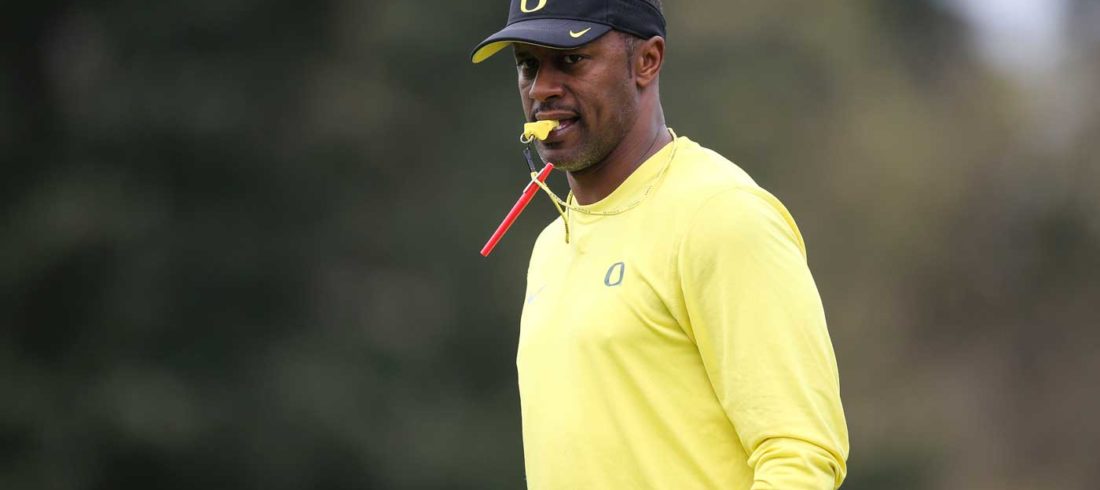He’s only been in Eugene a few months, but Willie Taggart feels right at home.
“Everything is so close,” says the new University of Oregon head football coach with a sly grin. “It wasn’t that way when I first got here, but I found the little roads and the back roads to certain places. I know the Delta Highway like the back of my hand now. I can drive up and down from Portland like I’ve been here forever.”
He adds: “So I feel like I’ve got it down.”
Oregon fans can only hope the transition to head football coach is just as seamless for him, commencing a new era for Duck football. The old slogan “Win the Day” has been replaced with “Do Something,” but the goal remains the same. After Mark Helfrich was fired for having a 4-8 record last season (Oregon’s first losing campaign since 2004), Taggart was hired to get the program back to contending for Pac-12 titles and playing in the National Championship game (as it did a mere two years ago).
His track record suggests that he can do it. During his time at the University of South Florida, for example, he took a 2-10 squad in 2013 and turned it into a 10-2 team in 2016. That said, the 40-year-old from Bradenton, Florida, emphasizes that UO’s rise back to prominence won’t be immediate.
“We’re nowhere near where we need to be as a football team,” Taggart says. “We have some good players, but we don’t have a lot of depth, and that’s going to be a work in progress.”
 He continues, “I know that whenever there’s change, you have to learn to trust each other, and that doesn’t happen overnight. But our guys are starting to learn to trust us and we’re starting to learn to trust them. Everyone wants to get this program back to where it should be.”
He continues, “I know that whenever there’s change, you have to learn to trust each other, and that doesn’t happen overnight. But our guys are starting to learn to trust us and we’re starting to learn to trust them. Everyone wants to get this program back to where it should be.”
And in Taggart’s opinion, it isn’t just a matter of tweaking Xs and Os to reverse course. He believes the team lacked a certain intimacy, which created a disconnected, complacent culture. By the same token, he feels morale has already begun to improve during spring practices.
“I think [the] guys are starting to care about each other a lot more,” Taggart says. “I hardly see any of our guys by themselves. They’re always out with two or three guys with them. It’s hard to hold your teammates accountable when you’re not around them or when you don’t like them, but it’s not that way now. We’re a lot closer.”
Taggart’s players agree with that assessment, bringing what their coach calls the “juice” (energy) to whatever task they may face.
“The whole new coaching staff is great,” says offensive lineman Doug Brenner. “We have a whole new aura about this team. There’s been a championship mentality of coming together and working hard.”
Perhaps that’s due, in part, to Taggart’s connection to a very famous football family: the Harbaughs. He played quarterback for Jack Harbaugh at Western Kentucky University. Years later, when Jack’s son Jim Harbaugh was head coach at Stanford, Taggart spent three years as the running back’s coach for the Cardinals.
“They’ve meant everything to me,” he says of the Harbaughs. “I think what you see in coach Taggart today is everything I’ve learned from them. They’ve changed the way I’ve thought about things and helped me get to where I am. To be honest with you, they’re a big reason why I’m coaching. If they can change my life and make me a better person, then I can do the same for a lot of young men out there. They’re family, and I’m in debt to the Harbaughs.”
With spring practices in the books, Taggart is looking ahead to what must happen for his Ducks to be successful this coming fall. Since the coaches can’t work with the players again until August, he’s emphasizing the importance of accountability during the next couple of months.
“This summer is going to be critical,” Taggart says. “This team really needs to gel during this offseason where our guys can go out and work together. We have to get them where they’re doing that all the time and they don’t need the coaches to push them to get better. We need to get them to where they make sacrifices for this football team to get better.”
Nonetheless, he’s optimistic.
Taggart is eager for his UO coaching debut against Southern Utah University in early September.
“I’m very pleased,” he says, referring to where the team stands after spring ball. “They’re making the progress where we need it. I told them that climbing is easier than hanging on, and our guys are climbing each and every day.”


